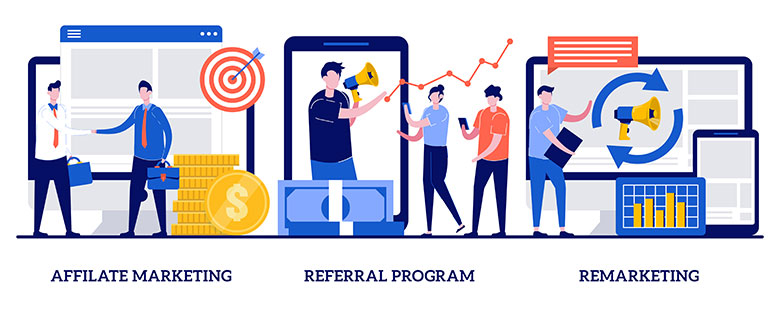
Mr. Bertes, could you tell us more about yourself and your professional background?
I have been working in Digital Marketing for more than 10 years, specializing mainly in Performance Marketing and Digital Strategy. During this period, I have assisted over 100 companies in fulfilling their digital transformation and achieving a robust and lucrative online presence, while I have handled more than 2.5 million Euros in Google & Social Media Ads. Since 2018 I have branched out into teaching post-graduate College students, while also training companies and entrepreneurs on improving their digital marketing skills.
I find it very challenging working with companies and helping them structure a solid and efficient digital strategy, but it is also very fulfilling and satisfying when these companies accomplish real digital transformation and achieve their business goals.
How would you best describe today’s digital reality?
If I had to describe today’s digital reality in a few words I would say it is continuously evolving, vital, a huge opportunity and for sure not just the future, but the present. A very famous quote from Bill Gates springs to mind, which goes; “If your business is not on the internet, then your business will be out of business”, which – even though it is not recent – can still demonstrate the importance of today’s digital reality.
How to Integrate SEO, PPC, social media and content for a killer marketing campaign?
Surely it is not easy to present a whole digital strategy within some sentences, but first of all each entrepreneur should acknowledge that the benefits of a multichannel or even better an omnichannel approach will be multiplied compared to the results of a single-channel campaign.
Everyone would agree that SEO, PPC, Social Media Marketing and Content Marketing are the main Digital Marketing Channels – perhaps alongside E-mail Marketing – but it should be crystal clear that the lack of integration of these channels will sooner or later lead to inefficiency, missed opportunities and finally wasted money.
So, it is essential both for entrepreneurs and marketeers to recognize the importance of such an integration and build a consistent digital marketing strategy, integrating all the channels they are capable of utilizing, according to the goals, the industry and the status of their business.
What are the benefits of remarketing?
Remarketing is indeed a great tool in the hands of every marketeer. In order to understand its importance, we should be aware of a simple but insightful fact: Rarely a user that visits a website for first time is ready to purchase a product or service at that time, but he/she is much more likely to make a conversion in the near future, than someone who has not visited this website yet.
Bearing that in mind, I think it is easy for everyone to understand why targeting past visitors of a website is a very efficient method to:
- Acquire new customers, by capitalizing on lost website traffic
But apart from that, the benefits of remarketing are also:
- It helps significantly to achieve “top of mind” awareness, as your ads will be shown to past visitors again and again
- Remarketing can increase the social proof and authority of a company. Some users that will see your ads several times, will think you are spending huge marketing budget to show your ads that much, without knowing that your ads appear solely to them, because they have visited your website before.
- It is a tool with which you can target your audience with great precision, according to their behavior (like what pages they visited, at which period, how much time they spent on a website etc.), giving you the ability even to show them those specific products they saw or added to cart, via dynamic remarketing
- Remarketing is a very affordable marketing tactic, as it targets only a small portion of online users, those who visited your website
- It is available on a wide range of platforms and channels, helping to implement a multichannel approach.
Of course, the frequency with which you will show them your ads requires attention, otherwise there might be negative impact, if a user is viewing an ad of your company multiple times without interacting with it.

What are the most important KPIs to measure success?
KPIs are highly correlated to goals, so there isn’t a single KPI that is crucial for every company or for every campaign. In order to set an important KPI for a campaign, you should be aware of the goals of the business as well as the goal of each specific digital campaign.
But before naming some KPIs that most of the times can highlight a success, I would like to separate vanity metrics from actionable metrics. Vanity metrics are numbers that may look nice on paper, but don’t really mean anything important. Mainly they are quantitative KPIs, like Reach, Impressions and Clicks. On the other hand, the actionable KPIs are much more important and mainly are percentages or costs per specific actions (CPC, CPA, CPL, CPI, etc.). Therefore, each marketeer should be focused on actionable KPIs in order to measure success efficiently, setting aside some vanity metrics that may look attractive at first glance.
Now, if we are talking about e-shops, profit is their main KPI, so in digital marketing terms the most crucial KPI is ROAS, with some less important metrics being Cost per Conversion and Conversion Rate. If we are talking about a company that offers services perhaps the most meaningful KPI would be Cost per Lead, while for a locksmith running call-only ads could be the Cost per Call.
To sum up, in order to set a crucial KPI you should first know and understand the goals, but generally speaking, try to monitor the actionable KPIs much closer, rather than the vanity ones.
What lessons have you learned from the pandemic? (in terms of digital marketing)
If I had to mention one and only lesson, it would be to be flexible. Flexible on what you will promote (huge demand on online supermarkets, cameras, laptops, cleaning services, face masks, treadmills and other exercise machines etc.), flexible on adjusting the marketing budget (depending on the demand and the status of brick-and-mortar stores), flexible on customizing the marketing message and the CTAs according to the circumstances and restrictions and even flexible on how to communicate with each business as well as your team.
Apart from that, a lesson that every entrepreneur should learn is – as I said before – digital marketing in not the future of marketing, it is the present. More and more people are buying products and services online, especially during the pandemic, and businesses that were already online before that period reaped the fruits of their previous efforts.
On the other hand, most of the entrepreneurs that till then were neglecting the importance of digital marketing but after their physical stores where temporarily closed suddenly decided to begin having online presence, learned that it takes time and a solid digital strategy to build a profitable customer base and cannot be achieved overnight.
And finally, apart from the digital marketing aspect, I hope all learned from that pandemic to appreciate the little things in life and be grateful for what they have!











